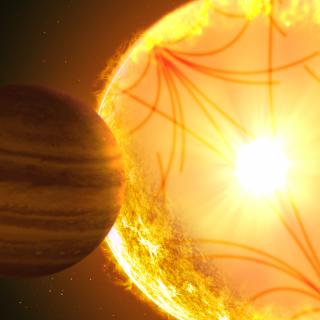Bibcode
Verner, G. A.; Chaplin, W. J.; Basu, S.; Brown, T. M.; Hekker, S.; Huber, D.; Karoff, C.; Mathur, S.; Metcalfe, T. S.; Mosser, B.; Quirion, P.-O.; Appourchaux, T.; Bedding, T. R.; Bruntt, H.; Campante, T. L.; Elsworth, Y.; García, R. A.; Handberg, R.; Régulo, C.; Roxburgh, I. W.; Stello, D.; Christensen-Dalsgaard, J.; Gilliland, R. L.; Kawaler, S. D.; Kjeldsen, H.; Allen, C.; Clarke, B. D.; Girouard, F. R.
Referencia bibliográfica
The Astrophysical Journal Letters, Volume 738, Issue 2, article id. L28 (2011).
Fecha de publicación:
9
2011
Número de citas
46
Número de citas referidas
44
Descripción
We calculate precise stellar radii and surface gravities from the
asteroseismic analysis of over 500 solar-type pulsating stars observed
by the Kepler space telescope. These physical stellar properties are
compared with those given in the Kepler Input Catalog (KIC), determined
from ground-based multi-color photometry. For the stars in our sample,
we find general agreement but we detect an average overestimation bias
of 0.23 dex in the KIC determination of log (g) for stars with log
(g)KIC > 4.0 dex, and a resultant underestimation bias of
up to 50% in the KIC radii estimates for stars with R KIC
< 2 R sun. Part of the difference may arise from selection
bias in the asteroseismic sample; nevertheless, this result implies
there may be fewer stars characterized in the KIC with R ~ 1 R
sun than is suggested by the physical properties in the KIC.
Furthermore, if the radius estimates are taken from the KIC for these
affected stars and then used to calculate the size of transiting
planets, a similar underestimation bias may be applied to the planetary
radii.
Proyectos relacionados

Sismología Solar y Estelar y Búsqueda de Exoplanetas
Los objetivos genéricos de este Proyecto son: 1) el estudio de la estructura y dinámica del interior solar, 2) la extensión de dicho estudio al caso de otras estrellas, 3) la búsqueda y caracterización de planetas extrasolares por métodos fotométricos (principalmente mediante el método de tránsitos) y espectroscópico (variaciones en la velocidad
Savita
Mathur